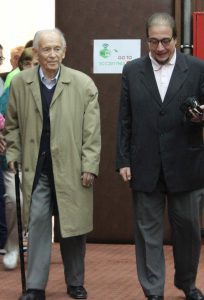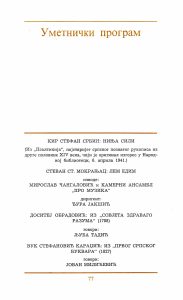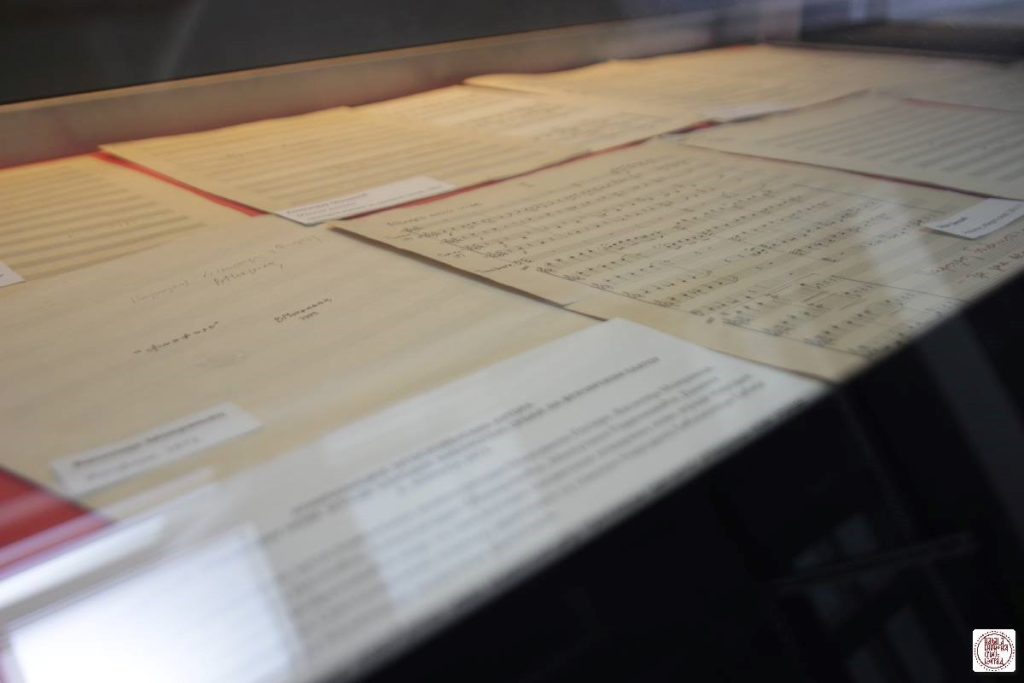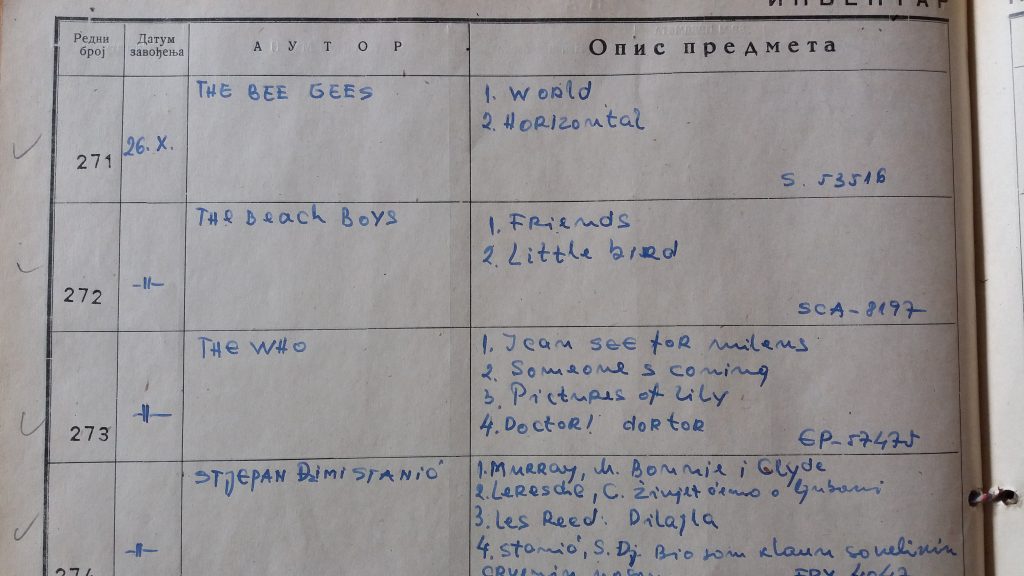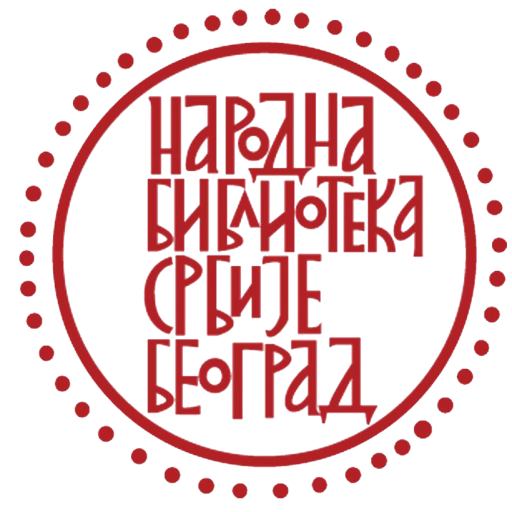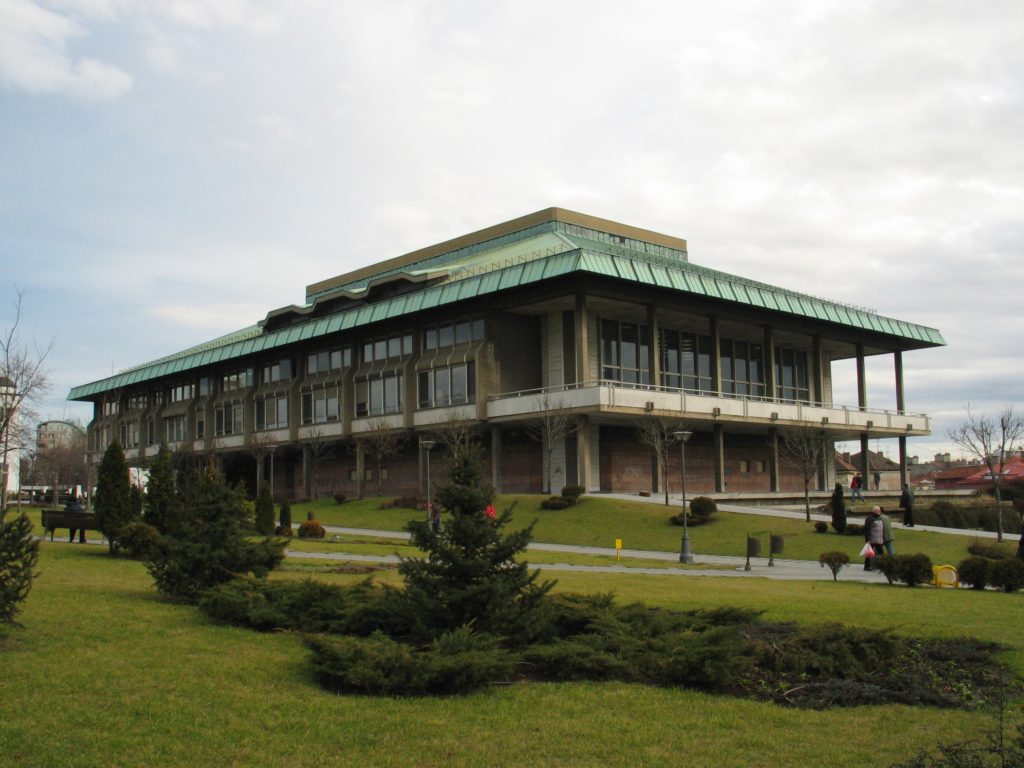- About us
-
- Catalogs and collections
-
-
- Collections
- The Collection of Handwritten Books
- Collection of Early Printed Books
- Reference Collection
- The Early Book, Rare Book and Miniature book Collections
- The collection of more recent literary manuscripts and archival materials
- Legal Information Centre
- Centre for Library and Information Sciences
- Music collection
- Visual Art collections
- Collection of CD Editions
- Cartographic Collection
- The Collection of Photographic Documents
- Other Special Collections
- Legacy Collections
- Collections
-
- Publications
- Services
- Ask librarian
- Contact
Music collection
Discover the diverse materials forming part of the music collection, encompassing both domestic and foreign printed and audio editions, as well as unique (unpublished) materials.
Users can access these materials at the Music Reading Room of the National Library of Serbia (Gallery, Room 316) or online through the Digital Library.
In addition to sheet music and audio recordings, our collection offers an array of reference literature for researchers, scholars and music enthusiasts. This includes music encyclopaedias, lexicons, publishing catalogues, electronic music publications and much more. You can delve into our electronic and card catalogues, peruse our collections and scan materials based on the guidelines outlined in the current Rulebook.
We are continually dedicated to expanding our collection.
We’ve put substantial effort into digitising old and unique pieces of sheet music and audio recordings. These digitised resources are grouped into various themed digital collections like printed sheet music editions, musical manuscripts and songbooks, all accessible on our Digital Library platform. Explore a wide array of digitised content, including folk songs, liturgies, church chants, hymns, Jovan Frajt’s music collection and compositions by Serbian composers such as Bozidar Joksimovic, Aleksandar Obradovic and others.
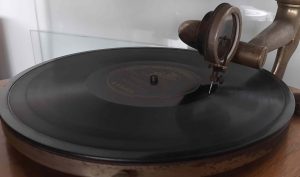
The initiative to digitise 78 rpm gramophone records began in 2004, aiming to safeguard our auditory cultural heritage stored on outdated media. Throughout this endeavour, we came across various challenges, encountering records that were broken, scratched or covered in dust, making them unplayable. Before digitisation, a valuable portion of our collection remained inaccessible and unused. As part of this ongoing project, the entire compilation of 78 rpm gramophone records will be digitised, encompassing the works and performances of both domestic and foreign figures. However, special attention has been given to Serbian records, and a proposal to recognise this segment as a culturally significant asset will be pursued after their identification, description and digitisation. Milan P. Milovanović has played a significant role in digitising and restoring most of these records.
The National Library of Serbia also undertook the project titled Performances at the National Theatre in Belgrade: historical opera recordings from 1969 to 1989 as another significant step in preserving auditory cultural heritage. Unique audio cassettes, generously donated by Mr Husnija Kurtovic, have been digitised as part of this initiative. Supported by the Association for Recorded Sound Collections (ARSC), the project offers experts and the public a chance to delve into the past by listening to performances from renowned artists like Plácido Domingo, Mario Del Monaco, Elena Obraztsova and Luciano Pavarotti, among others. Domestic singers such as Radmila Bakočević, Živan Saramandić, Milka Stojanović, Biserka Cvejić and many more are also featured in these historic recordings. Milan P. Milovanović led the digitisation and restoration efforts for these cassettes, ensuring their preservation for future generations.
Digital-born Materials – The Library as the Content Creator
The National Library of Serbia has embraced the concept of actively generating its own content by initiating the Audio Archive of the National Library of Serbia (aArh), a collection of original digital audio recordings capturing its public events. Although currently in a trial phase and not yet fully accessible to the public, the Library has been systematically recording all its professional, scientific, cultural and artistic events since 2016. These recordings are catalogued and managed using an online form titled Event Registration at the National Library of Serbia.
Let’s Not Skip Anything – Crowdsourcing
In our endeavour to capture and safeguard the distinct essence, ideas, and ambience of various events, we collaborate closely with our users and visitors. Many have graciously shared their recordings — whether amateur, semi-professional or professional — captured during past events at the National Library of Serbia. We extend an invitation to all who possess such recordings to contribute copies of conversations with notable figures, launches of new publications, panel discussions, forums and an array of other events recorded at the National Library of Serbia.
Did you know…?
…that the new building of the National Library of the Socialist Republic of Serbia, dubbed the “House of the Most Beautiful Words” by Mirjana Vlajić in an article published in Vecernje novosti, was ceremoniously opened on 6 April 1973?
On that very day, thirty years before, Serbian culture suffered a profound loss. The National Library building on Kosančićev venac was tragically destroyed, taking with it invaluable fragments of our written national heritage. Among the irreplaceable losses was the original manuscript of Ninja sili nebesije by Kir Stefan the Serb, an ancient Serbian musical script dating back to the latter half of the 14th century, lost in the flames caused by the bombing. Interestingly, the rendition of this composition marked the beginning of the artistic programme during the grand unveiling of the new building on April 6, 1973, imparting a deep and symbolic significance to the event.
…that renowned Yugoslav composers such as Mihovil Logar, Vasilije Mokranjac, Enriko Josif, Dejan Despić, Aleksandar Obradović, Milutin Radenković, Dušan Radić and Vitomir Trifunović dedicated their short musical compositions, characterised by their grand and fanfare-like nature, to the inauguration of the new Library building at the Vračar Plateau?
These pieces were first performed at the grand opening of the new building in 1973, an event directly broadcasted by Belgrade Television and Radio.
…that the sheet music collection of the National Library managed to evade a fatal fate on 6 April 1941?
Historian and former acting director of the National Library, Dejan Ristić, pointed out a significant event in July 1939, mere months before the outbreak of the Second World War. At that time, the director, Dragoslav Ilić, authorised a permanent loan of the Library’s entire sheet music collection to the newly established Music Academy in Belgrade. In his book The House of the Unburnable Words (Kuća nesagorivih reči, Belgrade, 2016), Ristić detailed that this musical collection comprised around 841 items.
…that in 1973, the music reading room was equipped with sound-proof booths and state-of-the-art sound reproduction equipment?
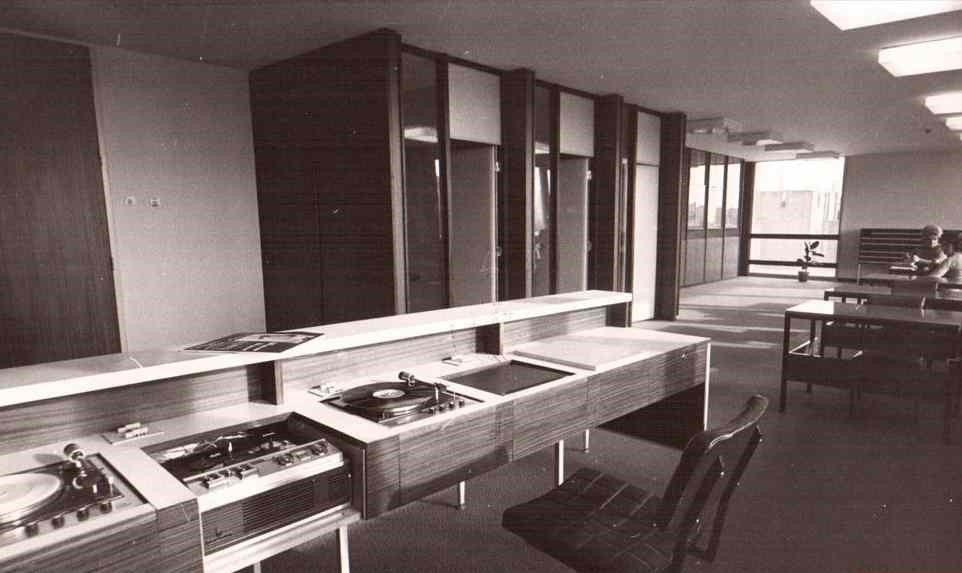
The Music Reading Room
Opening Hours of the Music Reading Room
Weekdays from 8 AM to 3 PM
NBS Gallery, Room 316
Collection Curator
Mr Vesna Aleksandrovic, Library Advisor
Email: vesna.aleksandrovic@nb.rs
Phone: +381 11 2451 242, ext. 79
Sheet Music Collection
The Music Collection includes music manuscripts and printed sheet music. It was assembled in the latter half of the 20th century through legal deposits, acquisitions, donations and exchanges. Its foundation was laid by generous donations and legal deposits and further expanded by purchases.
However, the collection remains incomplete, both in terms of domestic and renowned foreign works. Efforts to reconstruct the collection have had some success, yet the Library still lacks certain domestic editions predating the war. Moreover, works by local composers published internationally are scarce due to limited donations. Therefore, composer Ivan Jevtić’s gesture of donating several compositions published in Paris to the National Library of Serbia with a dedicated note, stands out as a rare and notable contribution.
The existing Music Collection, comprising roughly 19,000 items, serves as a strong foundation and, with strategic acquisitions and expert curation, has the potential to become an all-encompassing repository fitting the stature of its parent institution. A unique aspect of this collection is its treasury of music manuscripts, featuring works by prominent composers like Isidor Bajić, Davorin Jenko, Dejan Despić, Božidar Joksimović, Branko Cvejić and Milivoj Crvčanin.
Some of the most valuable works in the collection include:
- Serbian Folk Songs by Kornelije Stanković from 1859
- Church Chanting Textbook and Rules by Branko Cvejić from 1950
- Compositions dedicated to the inauguration of the National Library on 6 April 1973. These include works by prominent authors, such as Mihovil Logar, Enriko Josif, Aleksandar Obradović, Milutin Radenković, Dejan Despić, Vitomir Trifunović, Dušan Radić and Vasilije Mokranjac.
The music collection encompasses printed editions from both domestic and foreign composers, a wealth of pedagogical literature spanning various musical education domains and levels, as well as an extensive collection of domestic and foreign reference materials, including encyclopaedias, lexicons, dictionaries, manuals and more.
Additionally, part of the collection constitutes the legacy of Nikola Hercigonja.
Audio Collection
Bulbul Sings – Echoes of the Bosnian Soul from the Old Gramophone
The Library’s project of digitising 78 rpm gramophone records led to the creation of a presentation called Bulbul Sings – Echoes of the Bosnian Soul from the Old Gramophone. This initiative was prompted by the tragic events in Sarajevo between 1992 and 1995, which resulted in the destruction of the City Hall building, housing the National and University Library of Bosnia and Herzegovina. The loss included a significant part of the cultural heritage, particularly one of the largest collections of gramophone records in former Yugoslavia.
Over six years, the National Library of Serbia has diligently digitised its oldest gramophone records, thereby preserving, safeguarding and sharing records featuring folk music from Bosnia and Herzegovina. This collection aims to present less familiar insights into Bosnian 78 rpm records and reach a broader audience in an engaging and informative manner.
The presentation encompasses various elements: general information on the digitisation project, narratives about the earliest gramophone records from Bosnia and Herzegovina dating back to the early 20th century, descriptions of the collection items, excerpts from publishers’ catalogues of the earliest Bosnian records, record labels, artist images and 93 songs performed by Bosnian and Serbian artists, accompanied by associated metadata. Vesna Aleksandrovic and Ivan Pešić are the authors behind this presentation.
The phonographic document collection was established back in 1963. It encompasses a variety of audio recordings across different media, such as magnetic tapes, gramophone records, audio and video cassettes, compact discs and the increasingly common CD-ROMs. Apart from the legally-required deposits, this collection grows through exchanges, purchases and donations.
This compilation of phonographic documents encompasses recordings of diverse music genres by both local and international artists, along with spoken and literary texts and a range of audio-visual publications. Additionally, it has been enhanced by around 200 gramophone records at 78 rpm from well-known foreign discographic companies like His Master’s Voice and Odeon, among others, all created using outdated technology. This collection holds particular importance because our country didn’t have its own gramophone record production before World War II. It allows us to hear the voices of local artists such as Dobrica Milutinović, Olga Ilić, Josip Rijovac, Mijat Mijatović, and enjoy works by Stanislav Binički and Petar Konjović.
Moreover, this collection features audio recordings of prominent figures such as Ivo Andrić, Miloš Crnjanski, Desanka Maksimović, Vuk Karadžić, as well as renowned actors like Milivoj Živanović, Ljuba Tadić, etc.
The legacy of Miloš Jevtić is a great addition to the collection. It encompasses conversations with luminaries who have made enduring contributions in the fields of science, art and politics.

